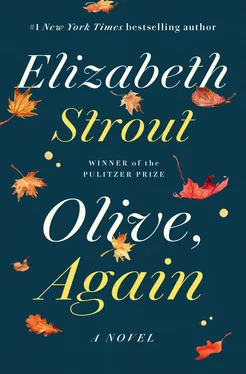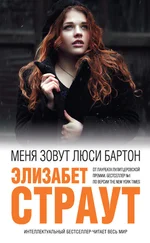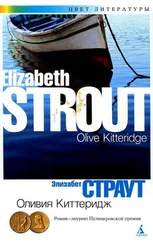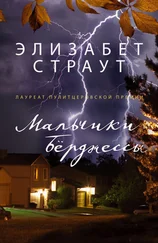By the side of the road stood Anita Coombs, next to a low blue car with a bent fender. Fergus pulled his truck over and got out. There were no other cars around, it was on the road out toward the Point, and all one could see were fields. The sun beat down and made Anita’s fender glint. “Oh, Fergie,” she said as he approached. “Boy, am I glad to see you. This damn car broke down.”
Fergus put his hand out, and she handed him the key. Squashed into the driver’s seat, he tried to start the car and nothing happened. He tried a few more times, then got out and said, “It’s dead. Did you call anyone?”
“Yeah.” Anita gave a great sigh and looked at her watch. “They said they’d be here in fifteen minutes, and that was half an hour ago.”
“Let me call them,” said Fergus, and he took Anita’s phone and called the tow people and spoke to them brusquely. He gave her back the phone. “Okay,” he said. “They’re on their way.” He leaned against her car and folded his arms. “I’ll wait with you,” he added.
“Thanks, Fergie.” Anita seemed tired. She put her hands into the front pockets of her jeans and shook her head slowly. Then she said, “Where’re you headed?”
“Nowhere,” said Fergus, and Anita nodded.
It was Sunday afternoon. Fergus had gone back to the park in the dark last night and found his pup tent, standing by itself—he had been vaguely surprised to see that it was still there—and he had packed it up and put it into the back of his truck. Also in the back of his truck now, in a garbage bag, was his Civil War uniform, with the boots and the cap. This morning after breakfast—she had seemed calm again, never mentioning her foolish documentary—Lisa said, “I’m going to call Laurie. I don’t like that she’s so mad at me.” Fergus almost said, “I’m mad at you too,” but he didn’t; he just took the dishes and washed them while Ethel remained at the dining-room table, drumming her fingers on it. They could both hear, from Lisa’s room, her voice, but could not make out the words. But Lisa talked and talked and talked, and after a while Ethel said, “Come on, Teddy,” and took the dog out for a walk. When she came back she asked, “Still talking?” And after a moment Fergus said, “Yes.” Then he said, “Teddy, tell your mother I’m going for a drive,” and he had gone out in his truck with the intention of taking his Civil War uniform to the garbage can out near the Point and dumping it in there. In the truck he had said out loud a few times, “Creag Dhubh!” which was the war cry of the MacPherson clan, and then he stopped it; he thought of the Highland Games and wondered if that was foolishness too: standing there every summer in his kilt yelling that with the rest of the clan.
Now he said to Anita, “What do you think of Olive Kitteridge?”
“Olive?” said Anita. “Oh, I’ve always liked her myself. She’s not everyone’s cup of tea, but I like her.” After a moment she said “Why do you ask?” and Fergus just shook his head. Anita gave a small laugh. “She was the one—did Ethel tell you this?—who suggested to us when we were filling out those fishing licenses and they asked for the weight of the person, Olive said, ‘Why don’t you ask them what they think a game warden would say about how much they weighed?’ It was kind of brilliant. You know, you get these fatties in there and you don’t want to just say, Hey, how much do you weigh? So we started doing that.”
“Anita,” Fergus said, turning to her. “This is a hell of a world we live in.”
“Oh, I know,” Anita said casually. She nodded. “Yuh, I know.” She added, “Always has been, I suspect.”
“Do you think so?” Fergus asked. He looked at her through his sunglasses. “Do you think it has always been this bad, really? It seems to me like things are getting crazier.”
Anita shrugged. “I think they’ve always been crazy. That’s my view.”
And so Fergus thought about this.
After another few moments he said, “Things all right with you, Anita?”
She gave a sigh that made her cheeks expand for a moment. “Nah.” She looked both ways on the road and said, “Gary’s been a mess since he got laid off, and that was a few years ago, and my kids are crazy.” She looked at Fergus and made a circle around her ear with her forefinger. She said, “I mean, they are really crazy.” She shook her head. “You know what my oldest son is into? He watches some Japanese reality show on his computer where the contestants sniff each other’s butts.”
Fergus looked over at her. “ God ,” he said. Then he said, “Come on, Anita, the world has certainly gotten crazier.”
“Oh, maybe a little, who knows.” Anita shrugged slightly.
Fergus finally said, looking at the ground, “Well, kids. What can you do.”
“Nothing,” said Anita. “How are your girls?”
“Oh, they’re crazy too. Batty as can be.” He saw the tow truck across the field and motioned toward it and Anita said, “Oh, good.”
“You’re going to need cash for the tow,” Fergus said. “You got it?”
“No, just my credit card.”
Fergus reached into his pocket and gave Anita his roll of cash. He waited until the tow truck was driving away, Anita sitting in the front seat of it, waving to him, and then he got back into his truck and drove to the Point and threw his uniform into the garbage, pushing the bag all the way down into the bin. He wondered about Anita’s children, how crazy they were, or were not. Watching people sniff each other’s butts? Jesus God . That was pretty goddamn crazy stuff.
—
Back home, he was surprised once again to see Laurie’s car in the driveway, but no Teddy sat in it, and when he walked into the house he heard his television on. He knew it was his, and not Ethel’s, because of the kind of sound it made. He went straight into the living room and found Ethel and his daughters all sitting on his lounge chair, Ethel on the front edge of it, and one girl on each arm, and he was about to open his mouth and say What the hell when he saw that on the television screen was—it was Lisa—and she was dressed in leather and holding a whip, and she cracked the whip and a man moaned; his face was on the floor, turned to its side, and the image pixelated his face, but his buttocks were bare, and again this woman—Lisa—whipped him and again he moaned.
“Turn that off,” Fergus said. “Turn that off right now.” His wife pressed a button on a remote control, and the screen went a blank blue except for the DVD sign. “And who said you could use my TV?” Fergus added.
Lisa said, “We had to, Dad, because Mom’s is too old to take a DVD and she said she was ready to try and watch this, and so did Laurie—”
“Dad,” Laurie said. “You won’t believe this. She had one guy that she made roll around in like a hundred squished-up bananas and then—oh God, Dad, she took a dump on him!”
Fergus looked at Laurie hard. “And what changed your mind about this filth?”
Laurie said, “Well, Lisa and I had a really long talk and I began to think about it, and I think maybe she’s right, people should be educated, so I came here to watch it with Mom. And Mom said she would give it a try, because, you know, it’s Lisa, it’s her daughter—”
“Where’s Teddy?” Fergus looked around.
“He’s at his father’s. It’s Sunday.”
Fergus had an odd sensation of not fully knowing where he himself was. He said to Lisa, “You took a shit on a man?”
Lisa looked down. “That’s his thing, Dad.”
Читать дальше













